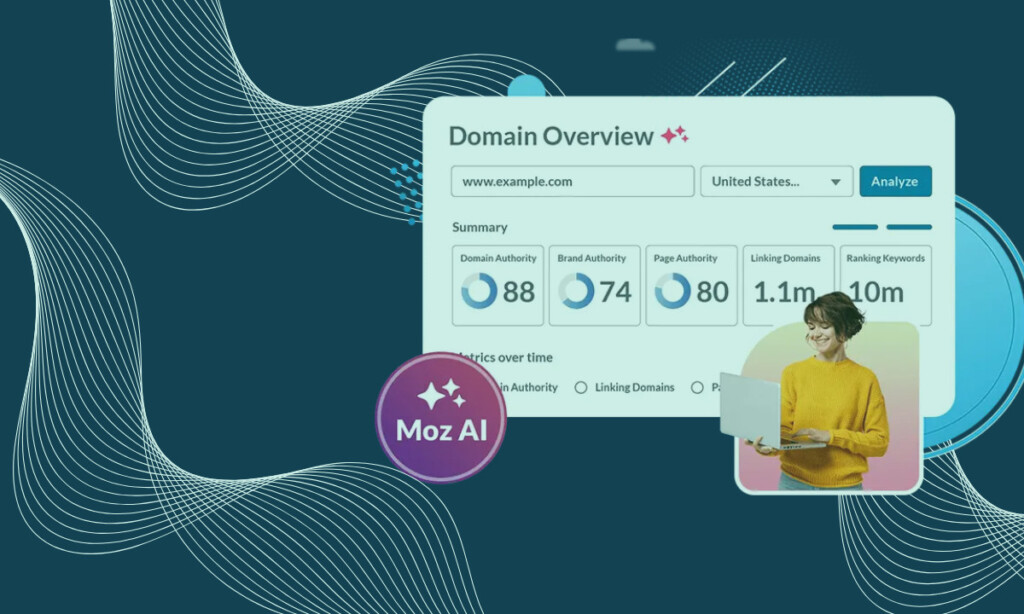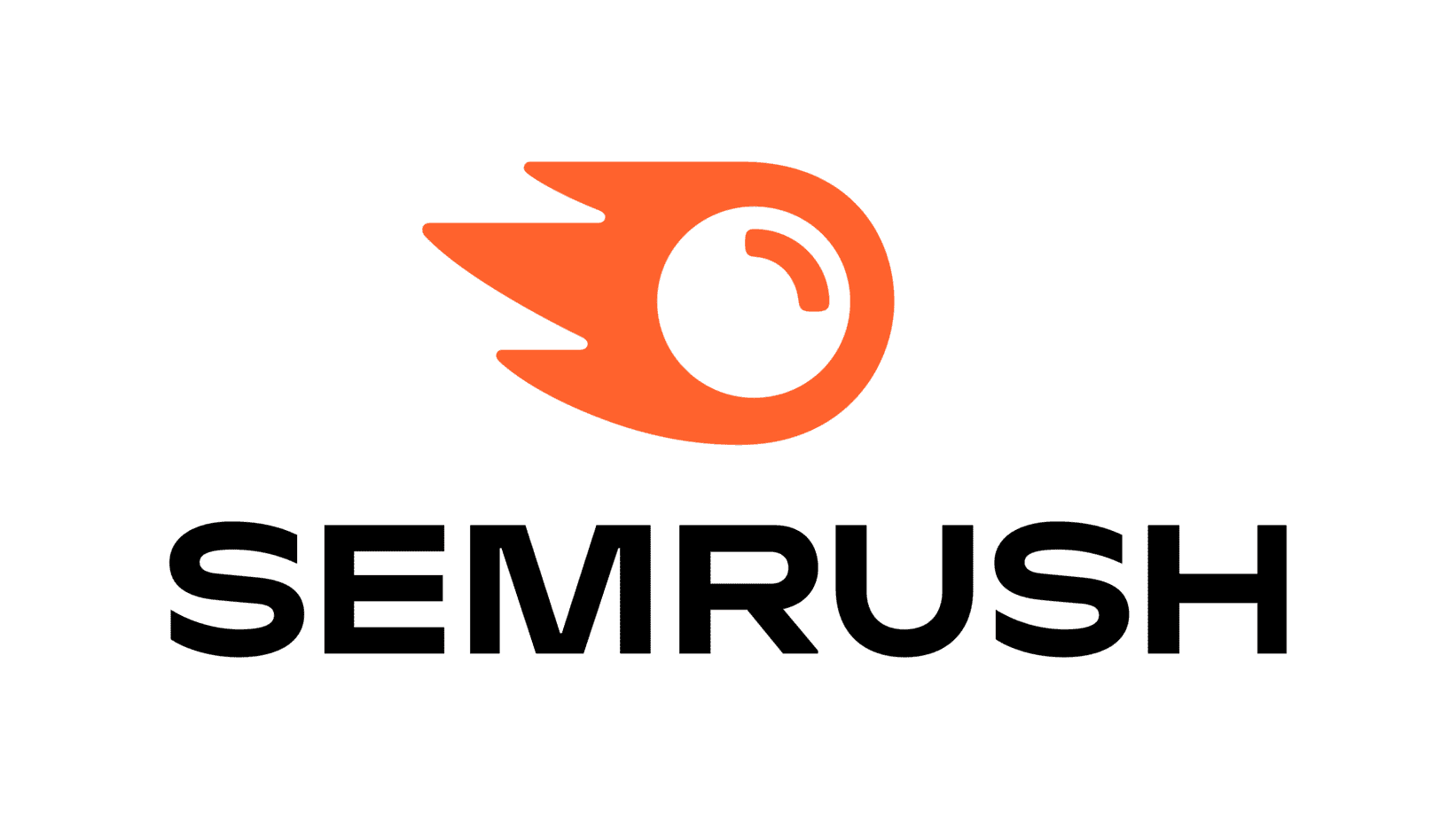Last Updated on August 27, 2025 by Ewen Finser
Moz was one of the first SEO tools I ever used. Back in the day, it was kind of the go-to if you were just dipping your toes into SEO and needed something approachable. I remember running my first audits there, obsessing over Domain Authority, thinking I had all the answers.
But over time, things started to feel… clunky. The UI didn’t evolve much. Keyword volumes came in vague ranges. Reports were limited unless you paid for the highest-tier plan. And while other tools kept shipping new features, Moz just kind of stood still.
So I started looking. Not just for something flashier — I wanted better data, more control, and ideally, something that saved me time instead of eating it.
What I found is that there’s no perfect replacement. But depending on your workflow, goals, or budget, some tools absolutely pull ahead.
Here are the top Moz alternatives I’ve actually used, tested and would recommend.
At a Glance:
- Semrush – Best All-in-One Moz Alternative
- Ahrefs – Best for Link Building & Deep SEO Work
- SE Ranking – Best Affordable All-Rounder
- SEO AI Agent by Writesonic – Best for Automation & Speed
- Serpstat – Best for Keyword Clustering & Budget SEO
- SpyFu – Best for Competitor SEO & PPC Research
- Search Atlas – Best for Agencies Using AI
- Ubersuggest – Best for Small Websites or Solopreneurs
Semrush has generously offered our readers a double extended fully featured FREE TRIAL. Play around with the suite for 2 full weeks to see if it's what you need!
1. Semrush – Best All-in-One Moz Alternative

If you’ve been doing SEO for more than a week, you’ve probably heard of Semrush. It’s not some trendy newcomer — it’s been around since 2008, and in my experience, it’s the most complete upgrade if you’re stepping away from Moz.
I first started using Semrush when Moz kept giving me keyword volume ranges instead of exact numbers. I’d compare the two against Google Search Console, and Moz’s estimates were always lagging or underreported. Semrush, on the other hand, caught more keywords, surfaced more competitor data, and gave me a way better view of what was happening on my site.
Two features I keep coming back to:
- Keyword Magic Tool – Just enter a seed keyword and you get thousands of ideas, all filterable by volume, intent, difficulty, SERP features and more. I’ve found keywords with this tool that Moz never even showed.
- Position Tracking – Semrush lets you track daily rankings across mobile/desktop, down to city level if needed. It even shows you which keywords moved and why, and you can set up alerts when rankings shift.
- Keyword Strategy Builder – A great feature when you are building pillar pages, and clusters of content. Gives you a full strategic overview and visual of your content clusters so you can optimize for all of them, not just individual pages, or articles.

And while Moz always felt like it was built for SEO only, Semrush goes broader. You’ve got built-in tools for:
- Paid search and display ads
- Competitor ad history
- Content topic research + AI writing
- Social media planning and analytics
- Client-ready reporting with white-label options
Honestly, the interface is cleaner too. I don’t find myself clicking around trying to guess where a report lives — it’s all there, logically grouped.
How is Semrush keeping up with the changes in the digital landscape?

One thing I continue to appreciate about Semrush is that they do not just build for what works in search, in paid, in social last year, but they are proactively updating this tool to give us more.
One of the new features I was happy to see is the AI Traffic Assistant which allows you to compare AI traffic sources on your site, and on competitor sites.

Who it’s best for: Agencies, freelancers, or in-house teams that need SEO + competitive intel + content strategy all under one roof. If you’re working across multiple channels or reporting to clients, it saves you from stacking half a dozen other subscriptions.
In the past, I’ve recommended Semrush for more experienced users, but the platform has become much more user-friendly for all, with straightforward tutorials, step-by-step instructions throughout the platform, even on new features.
Pricing: Starts at $129.95/month, billed annually. You can try a limited free plan, or go for the 14-day free trial of the Pro version. If it’s not for you, cancelling your free trial is really easy.
Bottom line: Semrush simply replaced Moz in my workflow and made me wonder why I stuck with Moz for so long in the first place.
Semrush has generously offered our readers a double extended fully featured FREE TRIAL. Play around with the suite for 2 full weeks to see if it's what you need!
2. Ahrefs – Best for Link Building & Deep SEO Work
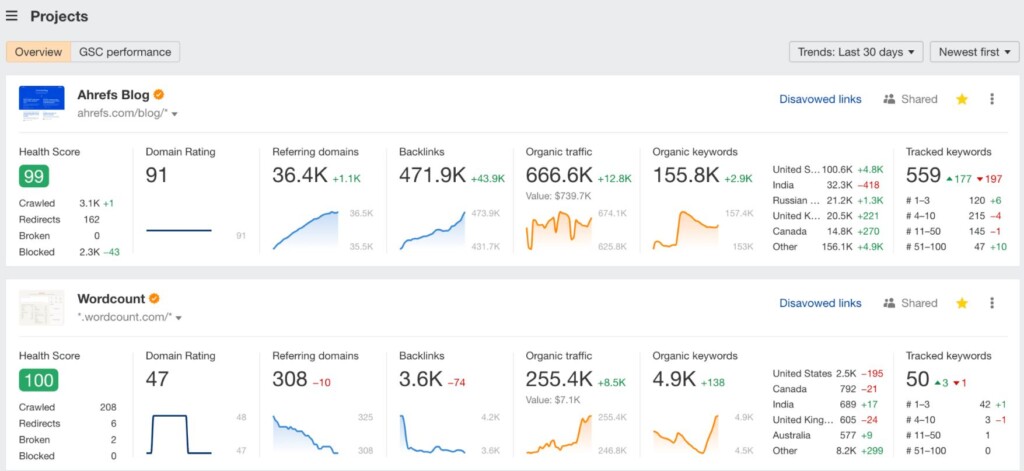
Ahrefs is one of those tools that just works. I picked it up after Moz left me guessing with limited backlink data and generic keyword suggestions. With Ahrefs, the difference was immediate.
The backlink analysis is probably the best in the industry. Their Site Explorer finds and lists linking domains, anchor text, link growth over time, even what type of content earns links in your niche.
The Keyword Explorer is another cool feature. Where Moz sometimes gives you vague keyword clusters or missing SERP info, Ahrefs breaks everything down with precision:
- Keyword difficulty based on actual backlink data
- Search volume per country
- Click-through rate estimates
- SERP history, so you can see how stable the rankings are
It’s also great for competitive research. You can pull up any domain, see their top pages, top keywords and estimate how much traffic they’re getting, all in one place.
That said, it’s not an all-in-one tool. You won’t find PPC data, content briefs, or social tools here. And it’s not cheap, especially if you need multiple seats or large data pulls. There’s no automation or AI magic either; you’ll be doing the work manually.
Who it’s best for: SEOs who want control and clarity. If you’re doing link building, technical audits, or deep keyword strategy, Ahrefs is about as close to “SEO power tool” as it gets.
Pricing: Starts at $129/month, billed annually. No free plan, but you can access Ahrefs Webmaster Tools for free if you verify your site.
3. SE Ranking – Best Affordable All-Rounder
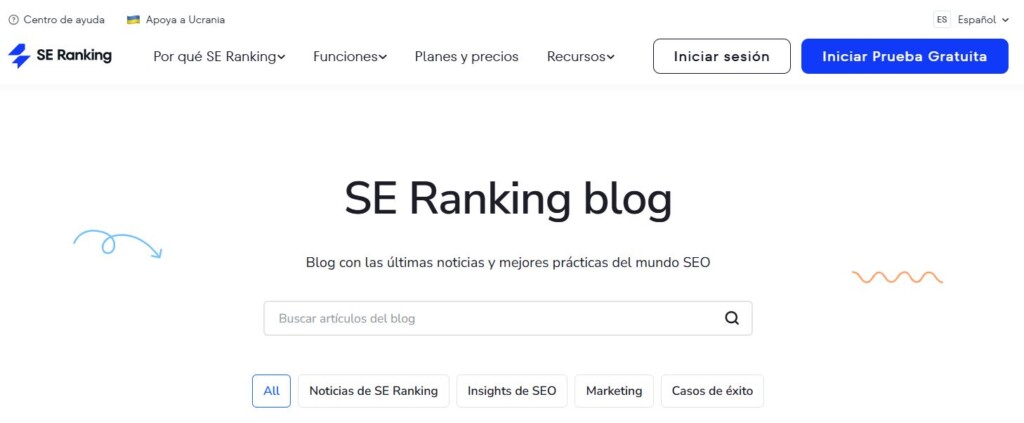
If Moz always felt a little clunky or overpriced for what it offered, SE Ranking is the opposite. It’s clean, fast, and covers most of what an SEO needs without draining your budget or overwhelming you with features you’ll never use.
I first tried SE Ranking on a smaller client project when I needed reliable rank tracking and site audits without a huge learning curve. And it delivered! The interface is intuitive (honestly, more polished than Moz’s) and the reports were surprisingly detailed for a tool at this price point.
You get a solid mix of features here:
- Daily rank tracking across locations and devices
- Technical audits with clear fix recommendations
- Competitor tracking that shows keyword overlaps and visibility trends
- White-label reporting for client-facing work
What stood out most was how lightweight it felt. There’s no bloat or no buried menus. You get clean tools that work.
It’s not perfect. If you want full historical data or higher keyword limits, you’ll need to bump up to the Pro or Business plans. But for freelancers or small teams, the Essential plan seems to be a sweet spot.
Who it’s best for: Freelancers, solopreneurs, or agencies that need solid SEO features without enterprise pricing.
Pricing: Starts at $65/month (billed annually). 14-day free trial available. No credit card required.
4. SEO AI Agent by Writesonic – Best for Automation & Speed
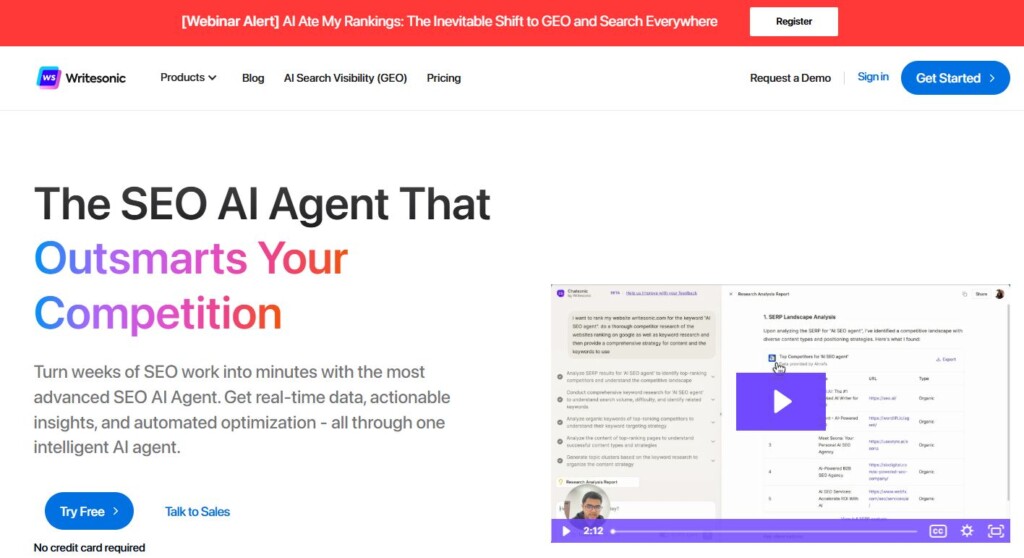
This one is an entirely different way of working.
SEO AI Agent by Writesonic flips the usual SEO tool model on its head. Instead of digging through dashboards and exporting reports, you type a prompt like “Give me keywords my competitors rank for that I don’t” — and it just does it. No tabs, no sheets, no filter tweaking.
It connects to tools you’re already using, like Google Search Console, Semrush, Ahrefs, and others, then pulls that data together into clear, fast outputs. I’ve used it to build content outlines, do site audits, even run competitor gap reports, all without switching platforms or wrangling data manually.
If you hate the usual SEO workflow, it’s perfect. Seriously, I haven’t opened Excel for a client keyword map in weeks.
That said, it’s not plug-and-play. You’ll need to link your tools and spend a little time setting up how you like to work. But once it clicks, it saves hours.
Who it’s best for: Solo marketers, content teams, or strategists who want speed and automation over raw horsepower.
Pricing: Included in Writesonic’s Business and Enterprise plans (starts at $19/month). Free trial available.
5. Serpstat – Best for Keyword Clustering & Budget SEO
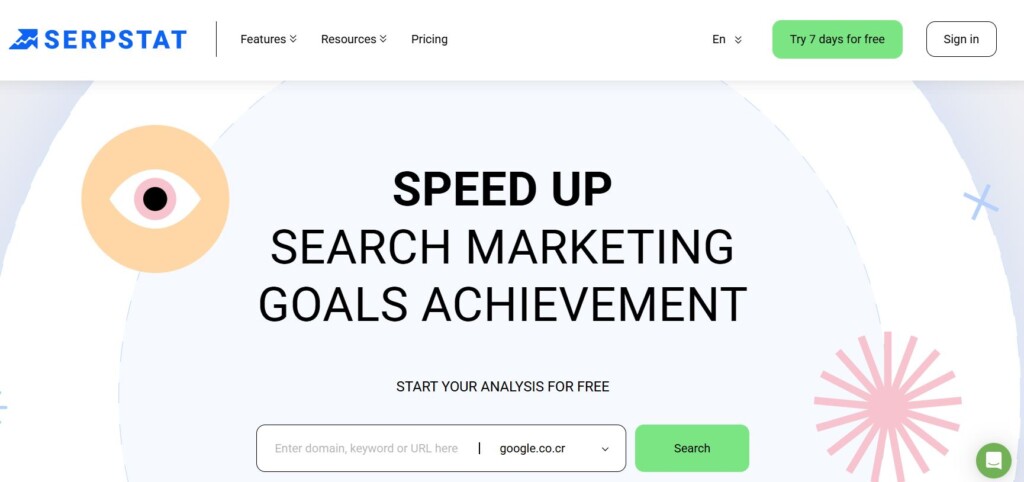
Serpstat is one of those tools that doesn’t always get the attention, but if you’re building out content hubs or topical authority, it’s kind of a hidden gem.
The keyword clustering feature is what actually makes it great. Drop in a batch of keywords and it automatically groups them by intent and semantic similarity. It saves a ton of time when you’re mapping out blog structures or trying to build an interlinked content plan. I’ve used it to plan entire silos in one go which is something Moz never handled well.
It also has basics like rank tracking, site audit and competitor keyword analysis, but don’t expect Ahrefs-level backlink data or lightning-fast UI. It’s slower, and some reports feel a bit dated. Still, for the price, it outperforms plenty of pricier alternatives.
Who it’s best for: Content teams, SEO writers, or anyone planning keyword-driven content at scale.
Pricing: Starts at $59/month, with occasional lifetime deals floating around. Free trial available.
6. SpyFu – Best for Competitor SEO & PPC Research
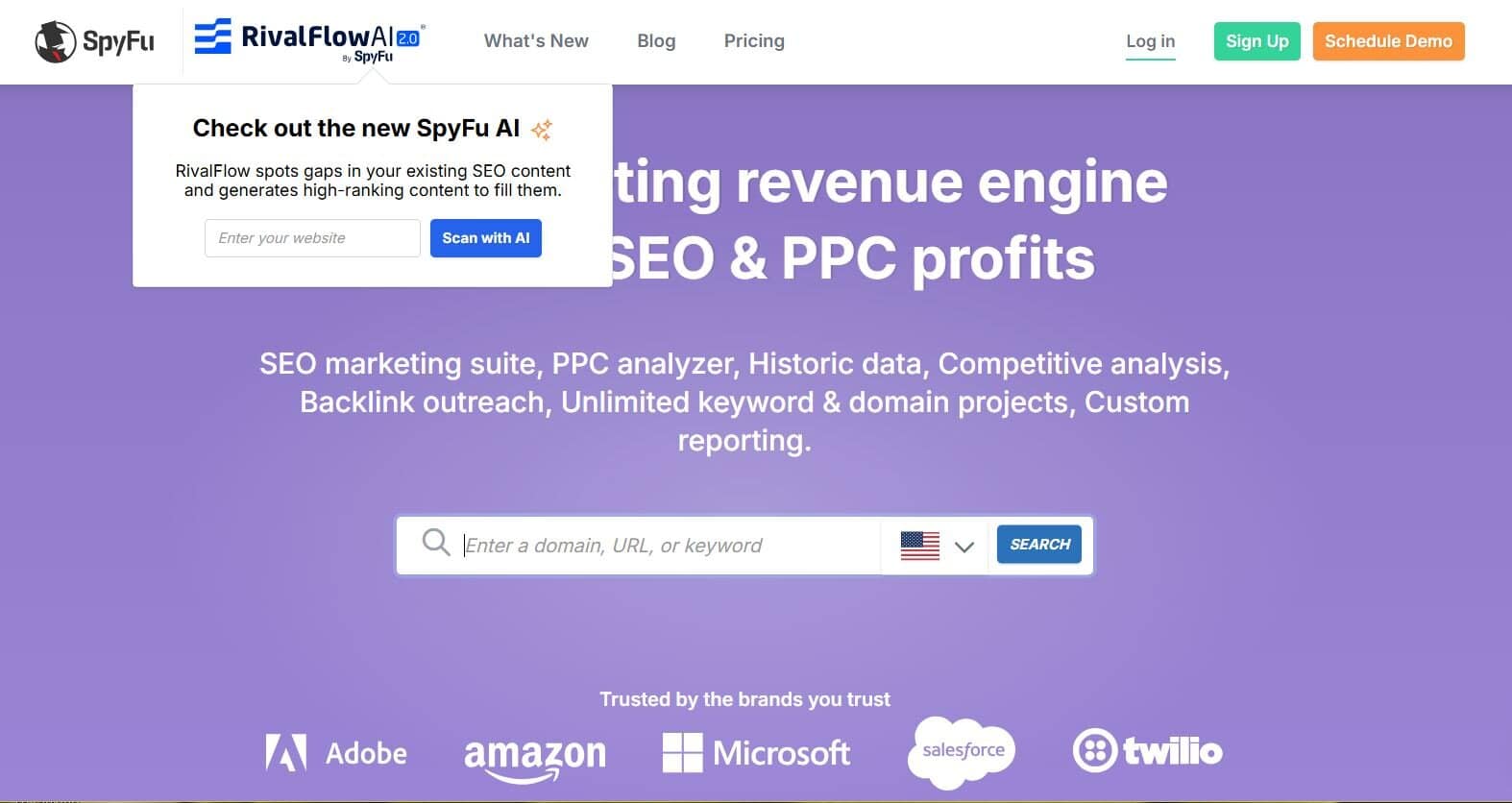
If your SEO game involves spying on the competition (and if we’re being honest, whose doesn’t?), SpyFu is probably for you.
It’s made for reverse-engineering other websites, from the keywords they rank for organically, to the ones they’re bidding on in paid search. It even shows historical ad copy, which is priceless when you’re figuring out what’s working in your niche.
One thing I genuinely appreciate: unlimited searches, even on lower-tier plans. You don’t get paywalled every time you look up a competitor, which, if you’ve ever used Moz’s free plan, is a breath of fresh air.
Where it’s not as great is backlink analysis and technical audits. Those areas feel a little underbaked, especially compared to Semrush.
Who it’s best for: Tactical SEOs, PPC managers and sales teams who want quick insight into what competitors are doing.
Pricing: Starts at $39/month, billed annually. Free demo available, no credit card needed.
7. Search Atlas – Best for Agencies Using AI

Search Atlas kind of snuck up on me. I didn’t expect much because it’s this new tool with flashy branding, but it’s way more capable than I gave it credit for.
What really stood out was the built-in AI assistant. You can generate outlines, optimize content, or analyze competitors with natural-language prompts. It’s not gimmicky either because it actually speeds up workflows that usually eat up hours. The reporting and data visualizations are great too, especially if you’re client-facing.
The keyword tools won’t blow Ahrefs out of the water, but they’re solid. Plus, the whole platform to me felt faster and cleaner than Moz. Better UI, fewer clicks, and with that, better momentum. You can tell it’s being updated constantly, which matters when SEO changes every other week.
Who it’s best for: Agencies that want modern, AI-integrated SEO tools without cobbling together ten different platforms.
Pricing: Varies by module, with bundle plans starting around $79/month. Free trial available.
8. Ubersuggest – Best for Small Websites or Solopreneurs

Ubersuggest is one of those tools I still recommend to friends who are just getting into SEO. If you’re running a blog, a small biz site, or a passion project, it gets the job done — and the lifetime deal alone makes it hard to ignore.
You get basic rank tracking, content ideas and a good enough keyword tool to build out articles or landing pages. It’s fast, light and doesn’t overwhelm you with features you’ll never touch.
However, the search volume data isn’t always spot on. Sometimes you’ll see inflated numbers or a few odd gaps. But for the price (especially if you catch one of their promos), it’s a trade-off I can live with.
Who it’s best for: Bloggers, solopreneurs and small business owners who want something simple and affordable that still works.
Pricing: Lifetime access often available for around $120–$150. Monthly plans start at $29/month. Free version also available.
Semrush has generously offered our readers a double extended fully featured FREE TRIAL. Play around with the suite for 2 full weeks to see if it's what you need!
Final Thoughts: Don’t Just Replace — Upgrade
Let’s be clear — Moz isn’t bad. It’s just been outpaced.
The SEO landscape moves quickly and these days, most marketers aren’t relying on a single tool. You’ve got people pairing Semrush with SpyFu, Ahrefs with Serpstat, or another combination, depending on what needs doing.
So before jumping ship, take a second to think about what you actually need. Do you want in-depth data? A faster workflow? Or just cleaner client reports?
Because if you’re building your own SEO stack in 2025, you’ve got options. And frankly, they’re better than they’ve ever been.
If you haven’t tried Semrush yet, I still think it’s the most complete upgrade from Moz available. It’s been the most consistent tool in my workflow, whether I’m running audits, chasing rankings, or mapping out a content plan.
Give it a proper trial. Odds are, you won’t go back

